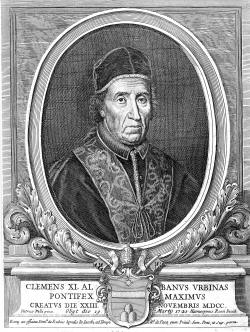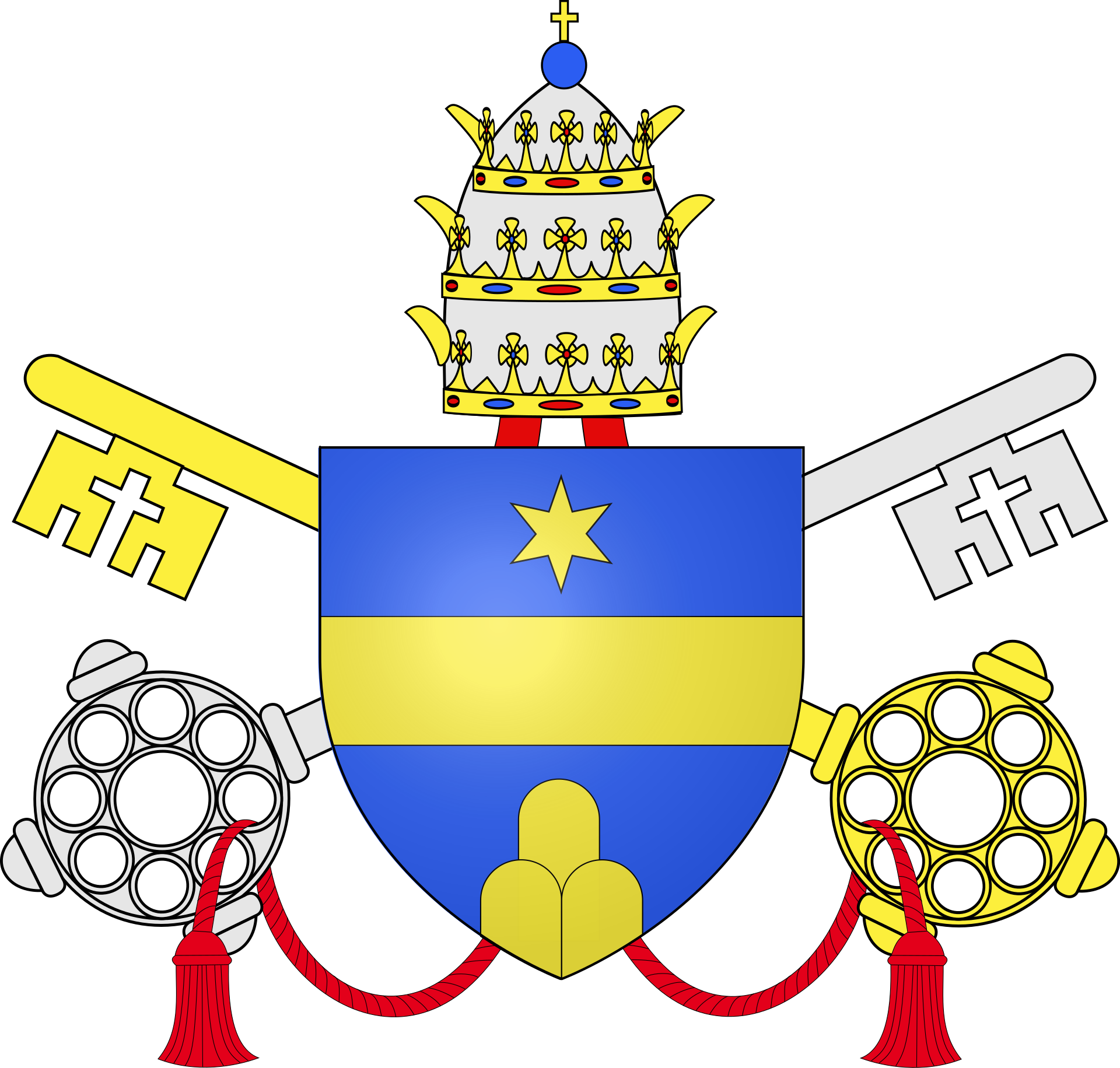
Clement XI was the 243rd man to serve as leader of the Catholic Church and the 11th of such individuals to choose Clement as his name.
This article will try to distinguish him from the many other popes by showcasing his life, papal legacy and even give a few personal tidbits about the man at the end.
Pope Clement XI Profile
| Pontiff number | Pontificate | English / Latin Name | Birth name | Date and Place of birth | Age at start/ end of papacy |
| #243 | 23 November 1700 – 19 March 1721 (20 years, 116 days) | Clement XI CLEMENS Undecimus | Giovanni Francesco Albani | 23 July 1649 Urbino, Marche, Papal States | 51 / 71 |
Life Before the Papacy.
Giovanni Albani was born to nobility on both sides: his mother, Elena Mosca, was high nobility from Bergamo and his father Carlo Albani was descended from the Staccoli family of northern Albania. He received education at the Roman college, becoming quite skilled at Latin and earning doctorates in canon and civil law. He also frequented the academy of Queen Christina of Sweden.
He served as papal prelate under Pope Alexander VIII and was made Referendary of the Apostolic Signatura by Pope Innocent XII. In addition to his work for the Church, Albani also served as governor of Rieti, Sabina and Orvieto.
Alexander VIII made him Cardinal-Deacon Albani of Santa Maria in 1690, despite some protest. After some discussion, he was relocated to the Diaconia of San Adriano al Forno. Later, he became Cardinal-Priest of San Silvestro in Capite. After his ordination to the priesthood in September of 1700, he celebrated his first Mass on October 6th within Rome.
Papal Acts and Legacy.

- After pressure to defend Rome and much of northern italy having been conquered, he declared Charles, Archduke of Austria to be the King of Spain in January of 1709.
- He issued a papal bull declaring 101 propositions by the Jansenist philosoopher Quiznel to be heretical. This bull had limited effect as many local French governments did not receive it.
- He had the “Illyricum Sacrum” commissioned. This is one of the preeminent works on Albanian culture. In total it is over 5,000 pages across multiple volumes.
- He extended the feast of Our Lady of the (Holy) Rosary to the Universal Church of the Roman Rite in 1716.
- He added 70 men to the cardinalate, including Michelangelo dei Conti who would become Pope Innocent XIII.
- In regard to the “Chinese Rites controversy,” he considered adjusting Christian language to satisfy the Chinese culture as dancing with heathen ideas.
- He was the first pope to patronize excavating the Roman catacombs. Notably, there are 14 different major sections of these catacombs, including one section that was just for people of the Jewish faith.
Pope Clement XI Coat of Arms

List of Events In The Life of Pope Clement XI ( Giovanni Albani )
| Date | Age | Event | Title |
|---|---|---|---|
| 23 Jul 1649 | Born | ||
| 13 Feb 1690 | 40.5 | Elevated to Cardinal | |
| 10 Apr 1690 | 40.7 | Installed | Cardinal-Deacon of Santa Maria in Aquiro |
| 22 May 1690 | 40.8 | Appointed | Cardinal-Deacon of Sant’Adriano al Foro |
| 30 Mar 1700 | 50.6 | Appointed | Cardinal-Priest of San Silvestro in Capite |
| Sep 1700 | 51.1 | Ordained Priest | Priest |
| 23 Nov 1700 | 51.3 | Elected | Pope (Roma, Italy) |
| 30 Nov 1700 | 51.3 | Ordained Bishop | Pope (Roma, Italy) |
| 8 Dec 1700 | 51.3 | Installed | Pope (Roma, Italy) |
| 19 Mar 1721 | 71.6 | Died | Pope (Roma, Italy) |
Quick Facts About Pope Clement XI.
- He was born in Papal State Urbano on July 23rd, 1649.
- His birth name was Giovanni Francesco Albani.
- He died on March 19th, 1721.
- The circumstances surrounding his death seem to be related to old age. He was 71 years old.
- His papacy began on November 23rd, 1700.
- His papacy ended on the day that he died.
- His papal successor was Innocent XIII.
Five Interesting Facts About Pope Clement XI.
- The War of Spanish Succession began soon after he became pope.
- Rather than be interred within a tomb, his body was buried within the pavement of St. Peter’s Basilica.
- Despite his disdain for nepotism, he had a nephew named Annibale who was made cardinal. Annibale’s appointment was regarded as one made by merit rather than familial bonds.
- Despite his unwillingness to localize religion for the Chinese, he was responsible for the addition of a large number of Asian texts to the Vatican’s library.
- He founded an art academy in the Campidoglio. It was focused on teaching painting and sculpting.